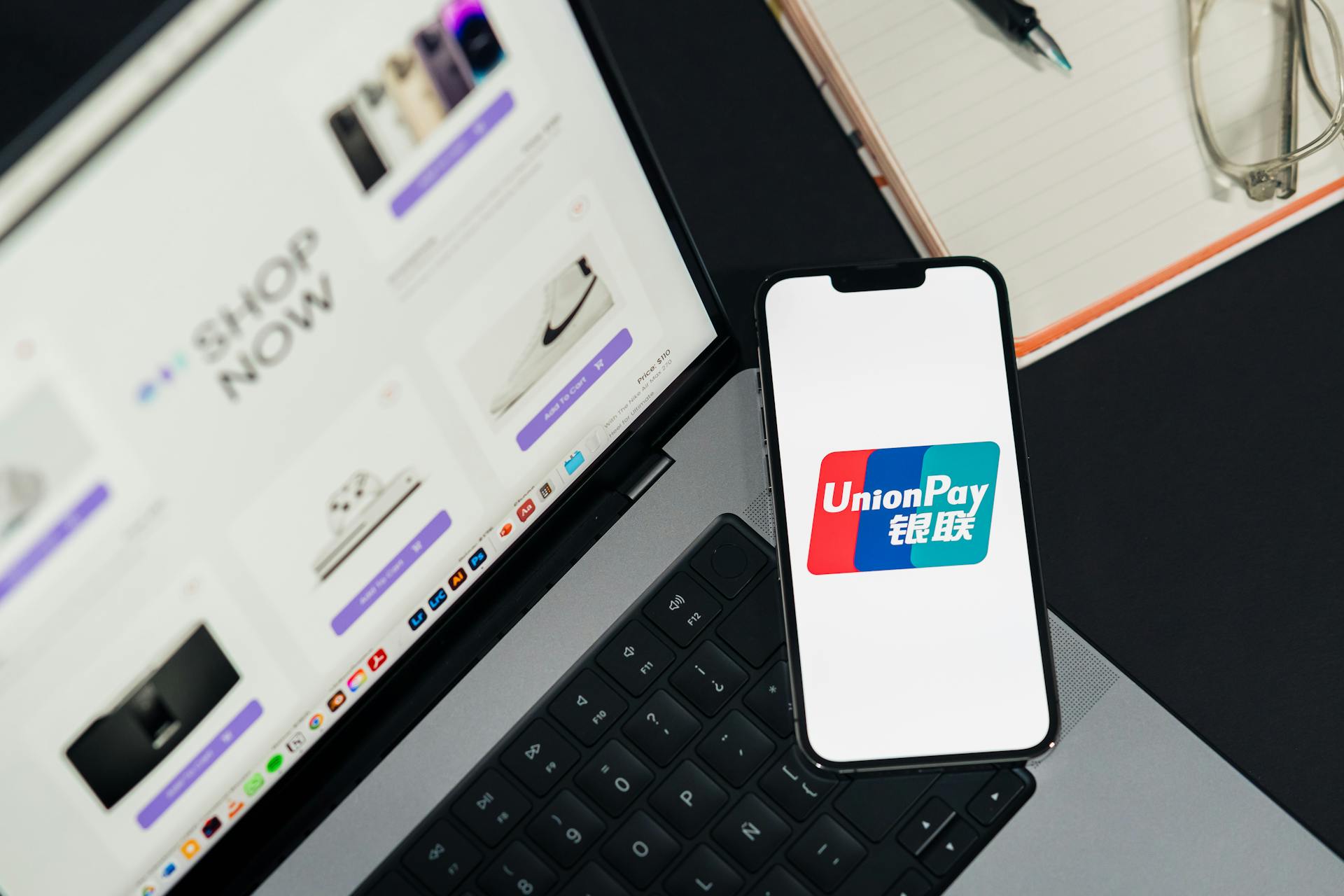
Applying for a commercial loan can be a complex and time-consuming process, but understanding the basics can make it more manageable. You'll need to provide detailed financial information about your business, including your income statement, balance sheet, and cash flow projections.
The lender will also want to know about your business's credit history, including any outstanding debts or past due payments. This information will help them determine your creditworthiness and assess the risk of lending to your business.
To increase your chances of approval, make sure your financial statements are accurate and up-to-date. This will give the lender confidence in your business's ability to repay the loan.
A commercial loan application typically requires a minimum credit score of 650 to qualify for a loan, although this may vary depending on the lender and the type of loan.
Readers also liked: 6 Pieces of Information for Loan Application
Types of Commercial Loans
Commercial loans come in various forms to suit different business needs. A commercial loan is often a short-term source of funds for a business, with short-duration loans for commercial real estate called mini-perm, having a three- to five-year term.
Some commercial loans are designed for specific purposes, such as equipment financing, commercial real estate loans, commercial auto loans, commercial construction loans, commercial bridge loans, and commercial hard money loans. These loans can help businesses purchase equipment, buy or renovate property, or finance new building projects.
The types of commercial loans include:
- Equipment financing: for purchasing large or highly specialized equipment
- Commercial real estate loans: for buying or renovating property
- Commercial auto loans: for buying vans, trucks, or other vehicles
- Commercial construction loans: for financing new building projects or major renovations
- Commercial bridge loans: for short-term financing in commercial real estate
- Commercial hard money loans: for loans based on the value of collateral, usually commercial property or land
Commercial loans can also be categorized into types like commercial real estate loans, commercial auto loans, commercial construction loans, commercial bridge loans, and commercial hard money loans. These loans often have unique features, such as balloon payments or shorter term lengths.
Micro
Microloans are a great option for small businesses that might not qualify for a traditional business loan. They're available in smaller amounts, typically up to $50,000.
Microloans are accessible to businesses with limited credit history or collateral, making them a more inclusive option. This is a big plus for new or struggling businesses.
These loans are often used by small businesses that need a little extra cash to get started or to cover a short-term financial gap. Microloans can be a game-changer for entrepreneurs who might not have the credit or collateral to qualify for a larger loan.
Here are some key facts about microloans:
- Typical loan amounts: up to $50,000
- Accessible to businesses with limited credit history or collateral
- Pros: accessible, cons: limited loan amounts
Lines of Credit
Lines of Credit can be a game-changer for businesses that sell on credit terms, providing a safety net to support the working capital cycle.
An LOC, or revolving credit line, is structured to revolve up and down as balances change in the company's working capital accounts, with no set repayment schedule.
This type of credit is particularly useful for businesses with ongoing expenses that need to be covered on a regular basis.
One popular option is the OnDeck Line of Credit, which offers credit limits from $6K to $100K and flexible repayment terms of 12, 18, or 24 months.
Businesses can draw from their OnDeck Line of Credit 24/7 to receive funds within seconds, making it a convenient option for smaller ongoing expenses.
Related reading: Commercial Capital Loans
Mortgages
Mortgages are a type of commercial loan used to finance or refinance commercial real estate. They're used exclusively for this purpose and have more flexible terms than other types of commercial loans.
Commercial mortgages can be used for owner-occupied properties or income-producing investment properties. The analysis and underwriting techniques vary depending on the type of property.
For owner-occupied properties, commercial mortgages often have longer amortization periods and more favorable loan-to-value (LTV) ratios. This means you can borrow more money based on the property's value.
Here are some key types of commercial mortgages:
- Commercial Mortgages: These are used to finance or refinance commercial real estate.
- Commercial Mortgages for Owner-Occupied Properties: These have longer amortization periods and more favorable LTV ratios.
- Commercial Mortgages for Income-Producing Investment Properties: These also have more flexible terms, but the analysis and underwriting techniques vary.
Commercial hard money loans, on the other hand, focus heavily on the value of your collateral – usually commercial property or land – when underwriting applications. They're not typically used for mortgages.
Where to Get a Commercial Loan
Traditional banks are a good fit for businesses with strong financial profiles and well-established operating histories, offering the most affordable interest rates.
They can impose strict qualifying criteria and have longer funding times than online lenders, so it's essential to meet their requirements.
If you're looking for more affordable interest rates, traditional banks are worth considering.
You might enjoy: Mortgage Rates Were Steady as Loan Application Volume Dropped.
Online lenders can be a good option for businesses with less-than-perfect credit or those that need faster funding times, but be prepared for potentially higher interest rates.
You can also use a loan marketplace like LendingTree to get multiple quotes from different lenders at once, making it easier to compare loan offers.
For another approach, see: How Do Lenders Verify Bank Statements
Acquisition
Acquisition loans are used by businesses that are buying other businesses or business divisions. These loans tend to have shorter amortization periods.
Acquisition loans have lower loan-to-values than other types of commercial loans. This means businesses will have to put up less equity to secure the loan.
Businesses should consider their financial situation and goals before applying for an acquisition loan. This will help them determine the right loan terms and amount.
Acquisition loans can be a good option for businesses that want to expand quickly, but they can also come with higher interest rates and fees.
Suggestion: Will Auto Loan Application Pull My Credit
Traditional Banks
Traditional banks are likely the best fit for businesses with strong financial profiles and well-established operating histories.
They generally offer the most affordable interest rates compared to other options.
However, traditional banks can impose strict qualifying criteria, which may make it difficult for some businesses to qualify.
They also have longer funding times than online lenders, which can be a challenge for businesses that need quick access to capital.
If you're a business with a solid financial history, traditional banks might be worth exploring for a commercial loan.
If this caught your attention, see: How Do Banks Price Commercial Loans
Compare Lenders
When comparing lenders, it's essential to shop around for the best rate. Business loan interest rates can vary significantly depending on the lender's estimation of your creditworthiness.
You can either go directly to lenders and get quotes through each website or use a loan marketplace like LendingTree to get multiple quotes at once. This will give you a better understanding of what different lenders are offering.
Consider all the criteria mentioned, like added fees and funding times, to ensure that you select the loan offer that best suits your business's needs. Don't just focus on the interest rate.
Consider reading: Interest Only Commercial Loans
Eligibility and Application
To qualify for a commercial loan, you'll need to meet specific criteria set by lenders. Lenders typically look for a credit score above 650, but minimum credit scores vary.
A well-structured business plan is essential, as it showcases your business strategy, market analysis, and financial projections. This helps lenders assess your business's future profitability and ability to pay the loan as agreed.
Your business's annual revenue is also crucial, as it helps lenders gauge its financial stability. Higher revenues typically improve your chances of loan approval and may help you secure better loan terms.
Time in business is another important factor, with many lenders preferring companies that have been in business for at least two years. This reduces lending risk, but if your business doesn't meet that benchmark, consider applying for startup funding instead.
To evaluate your eligibility, review the qualification factors, such as your business and personal credit score, annual revenue, time in business, and available down payment or collateral.
Gathering the necessary documentation is a crucial step in the application process. This includes financial statements, business plans, tax returns, bank statements, and business licenses and formation documents.
Here are the key factors to consider when evaluating your eligibility:
- Business and personal credit score
- Annual revenue
- Time in business
- Available down payment or collateral
Most lenders require a minimum credit score to qualify for a loan, which can vary from lender to lender. Traditional lenders typically have more stringent requirements than online lenders.
Sources
- https://www.investopedia.com/terms/c/commercial-loan.asp
- https://www.nerdwallet.com/article/small-business/commercial-business-loans
- https://www.lendingtree.com/business/commercial-real-estate-loans/
- https://corporatefinanceinstitute.com/resources/commercial-lending/commercial-loan/
- https://www.ondeck.com/loantype-commercial-loan
Featured Images: pexels.com


